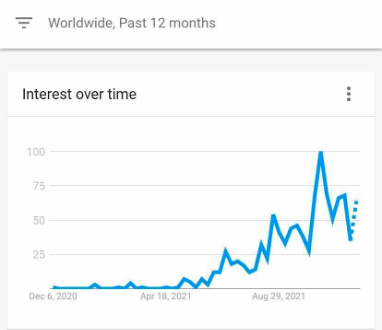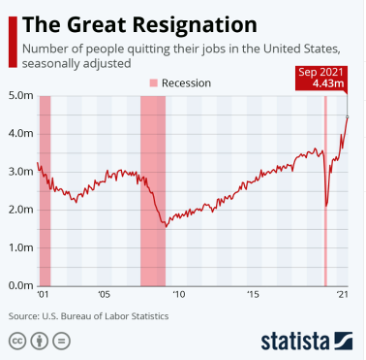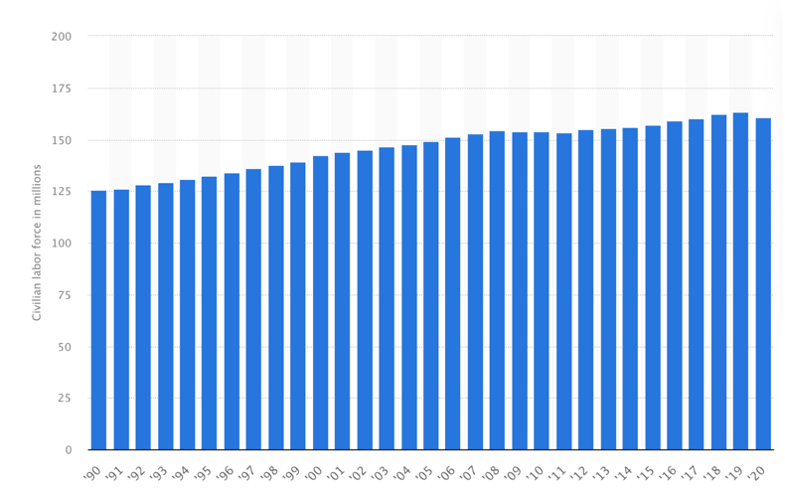The Great Resignation.
An expression we had never heard before May 2021, coined by an organisational psychologist (search: Anthony Klotz). Now used by every individual, organisation, and group to market their products and services. “Given the Great Resignation… buy this yogurt”. No thanks, we’re good.
Just look at the google search data on ‘The Great Resignation’. From 0 to hero, 220-odd million results. Wow!


Source: Google search
Look closer at the data. Big spike, and a deeply Western view. Think about tech and economic hubs (yep, Ireland, Singapore and USA) and think to Australia’s closed Island nation. Sceptic – could people really be talking (then the algo kicking into overdrive) about this to serve their own purposes? Read: we are seeing lots of people resign for bad cultures, bad organisations, work patterns etc. but hey, we are great (the market is tight, come check us out, woohoo!). And, if you want some real Friday beer fodder, check out reddit (r/antiwork/).
You’ll get a lot of n=1 examples of people being bad leaders. Bad employees.
Nothing special, or great, just a newfound voice to tell it.
Whether it’s a great marketing explosion for a sudden war for talent in pockets of the labor market (or not), or a pure mismatch of available talent and capabilities needed, there are no doubts that there has been a spike in resignations.
And while people have had a collective existential moment, they’ve also just reverted to the trend we saw way before the pandemic. Below shows the percentage of people quitting their jobs here in the USA – not in the relatively short pandemic (to date, despite how long it felt!), look at the 20-year patterns.

Source: Statista, from US Bureau of Labor Statistics
We see that since the last technical recession (the Global Financial Crisis, GFC, marked with red in the graph in 2008/2009), we’ve had A STEADY RISE IN THE AVERAGE RESIGNATION RATE.
We note the pandemic dip, but part of that is a hesitancy to change jobs in an unstable period and now, thinking conditions are better, a willingness to look and move again. If we drew a trendline, across the dip of 2020, the trend would sail comfortably to where we are at today.
If we look at the overall size of the (civilian) job market, it is only ~2% different (lower) to what it was before the pandemic. Interesting, but hardly ‘Great’.

Source: Statista ‘Civilian labor force in the United States from 1990 to 2020’
If we look at Australia, we are starting to get more balanced views hitting through the media on the data too.
The data is showing the same continuation of trends that simply paused at the height of the pandemic. We were already seeing a shift to a four-day working week at rapid rates, increasing flexibility, and a steadily increasing rise in those working in the gig economy. And sure, thankfully, the laggards have had to catch up on these things. Take a look at this report from our partner, the BankWest Curtin Economics Centre, from 2018 if you want to know more.
The opportunity is to now genuinely use this platform positively to focus on work, patterns, the agitation – to design better workplaces together that work for more of us. That’s cool!
So, if we take my contrarian, hopefully, more balanced view for a moment, the Great Resignation is really:
The Greatest Marketing Campaign of 2021.
Pure and simple, a clickbait dream.
Whatever is right or wrong, what should you be doing at work to support yourself, the people around you, and your organisation beyond the marketing?
Individually
- Think about what matters to you – at work and in life. What makes you tick? What do you love? What don’t you love? Is it the job and employer, or actually the way you’re working? That is a conversation employers are going to be more open to than ever before when constructive, and when it isn’t only about you.
- Hear all the voices – not just the loudest or biggest groups. The pandemic has been a source of varying grief for everyone on the planet, albeit very uneven. We hear voices that are shouting loudly and see a groundswell of support for naming what is bad regarding the pandemic, but we need to take a moment for what’s good in it too. As someone said to me today, ‘see the lemons, and how you might make lemonade from it’. Hear from everyone, don’t change your organisation on n=1 alone.
- Be empathetic to the experiences of others – and make a deliberate effort to connect, to belong. As I sat lonely in Philadelphia, and lonely in New York at times, I thought how lucky I am to do this work and be energised by people and conversations. But, we cannot wait on them to come to us, we should create them for others, especially those who have it tough. Think to the pandemic of loneliness, those living alone and working alone, and connect. ‘To have a friend, you’ve got to be a friend’.
Collectively
- Democratise design. Listen to everyone, and move from a passive ‘in the pandemic’ to an active and inclusive ‘with the pandemic’. What is happening to the people around me at work, and what should we do differently? What are your checkpoints on how that evolves, and commit to acting?
- Appreciate the experiences we’ve been through, and draw strength on what we can do together, whatever comes next. We’ve shown the resiliency we can draw on, and it will impact our lives forever. We are seeing the sprouts of optimism even with new strains and caution. We can do what is next, but our energy and resolve for that will be different for people on different days. Be stronger, together.
- Take a moment to think about both the immediate and the longer-term trends we’ve observed, to really re-design work. Work wasn’t working perfectly before. If you do anything, think with a new lease on life around the design of work.
- Appreciate that we must be balanced. We need to balance individuals, teams, and organisations. It’s not us against them, it is us with us.
And finally, as People & Culture professionals
Take a data-driven view, not just the loudest voice of a service provider, and don’t follow the big tech companies only. Recruiters and technologists (we still love you) and many more are going to be coming thick and fast on the burning platform. Listen, but don’t try to put out the fire until you see a genuine spark (and probably a spot-fire) in your organisation, with contextual data. Otherwise, you’re just going to have a wet house.
What you can do as P&C, is lean into conversations about people and experience. Don’t tell people what to do, or second guess ‘what’s wrong with them’, but do hear where they are at. You’ll be amazed at what you learn.
